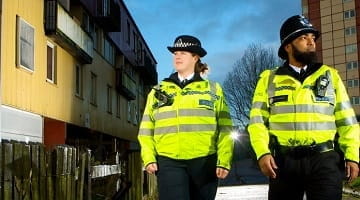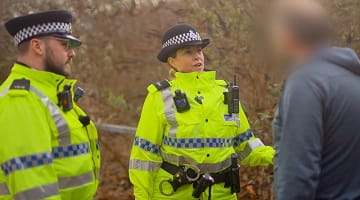About your course
The Police Constable Degree Apprenticeship is one of a number of entry routes into the policing sector. Successful applicants will enter a programme that will include on-the-job learning within police constabularies to ultimately become a police constable.
PLEASE NOTE: Applications for the Police Constable Degree Apprenticeship (PCDA) will only be to a host Police Force. Currently, the Police across England and Wales are involved in a procurement process. LJMU will be involved in the delivery of the PCDA, but each Police Force will retain control of their recruitment for the Degree Apprenticeship. To view current policing vacancies please view individual Police Forces' websites.
- The Policing Education Qualifications Framework (PEQF) introduced by the College of Policing states from 2020 there will be three entry routes into policing, including the PCDA
- Degree Apprentices will study for three years while training to become a police constable
- The starting salary for new PEQF entry Police Constables is £23,586
- Subjects you will study include: code of ethics; duty of care; professional standards; equality; service delivery; efficiency and effectiveness; value for money; diversity and human rights; criminal law; work with communities and evidence-based practice
- Delivered by experts in the Liverpool Centre for Advanced Policing Studies
An initial face-to-face period at University will be supplemented by access to police training facilities at Mather Avenue in Liverpool and Lea Green in St Helens. Academic staff will be supported by competent police practitioners, while learning will be classroom-based with scenario and role-play work. You will receive training on typical equipment utilised by police officers, as well as health and safety, police IT and systems. Many of our Policing Studies students receive specialist training and experiential events, such as the in Liverpool.
Further learning blocks across the rest of the programme will be supported by workplace education and practice. A reflective Occupational Competence Portfolio (OCP) will be compiled by the apprentices alongside the academic programme. Occupational competence will be a cornerstone, alongside intellectual ability. At the end of the programme, successfully completing the EPA will result in permanent appointment.
Deadline for applications: 30th June 2025
Course modules
What you will study on this degree
Further guidance on modules
Modules are designated core or optional in accordance with professional body requirements, as applicable, and LJMU’s Academic Framework Regulations. Whilst you are required to study core modules, optional modules provide you with an element of choice. Their availability may vary and will be subject to meeting minimum student numbers.
Where changes to modules are necessary these will be communicated as appropriate.
Core modules
Introduction to Policing
20 credits
20 credits
This module will discuss and establish whether the police service provides an effective service which meets the needs of diverse communities, identifying the necessity for effective regulation of the police service and the importance of maintaining professional and personal standards and values, and the impact this may have upon completion of duties and personal life. You will develop an understanding of the laws and legislation of England and Wales, and the powers and responsibilities bestowed upon a police officer.
Exploring Police Studies
20 credits
20 credits
This module aims to provide you with the necessary knowledge to enable you to demonstrate a structured approach to studying, writing essays and referencing content whilst identifying the need for self-evaluation, self-improvement and reflective practice, alongside recognising the need for a physical and psychological work-life balance.
Practice Procedure and Criminal Law 1
20 credits
20 credits
The aim of this module is to discuss the purpose and relevance of Response Policing, investigating the varied roles, key responsibilities and skills needed. The module will familiarise you with the potential causes and levels of conflict, recognising the appropriate levels of response and de-escalation. You will identify the legislation and guidance governing a lawful response to violence and the principles of negotiation and the use of force.
Inclusion, Vulnerability and Risk
20 credits
20 credits
This module will familiarise you with the complex nature of vulnerability whilst providing an understanding of how situational and environmental factors, combined with personal vulnerabilities, may result in a person becoming a victim and or perpetrator. You will explore how the effective use of training, knowledge and skills can assist in supporting those who are vulnerable and why it is necessary to use a safeguarding approach to those who are vulnerable. Also, you will investigate the need for first responders to identify their own vulnerabilities when dealing with sensitive or violent incidents.
Practice Procedure and Criminal Law 2
20 credits
20 credits
This module will provide you with an understanding of how those engaged in front-line local policing can assist in combatting terrorism by gathering intelligence. You will examine how the role of the front line officer can assist in identifying community vulnerabilities in a counter-terrorism context, and the appropriate actions they can take in safeguarding the public. You will gain an understanding of the fundamental principles, legislation and powers related to conducting effective, ethical and professional interviews.
Evidence-Based Policing 1
20 credits
20 credits
This module will discuss a range of key concepts relating to criminology, exploring the relationship between community engagement, crime prevention, and the local force strategy for developing an effective digital policing capability. You will be able to identify the importance of information and intelligence to all areas of policing, recognising the impact data protection regulations whilst identifying practical issues pertaining to the collection, retention and sharing of information and intelligence.
Core modules
Developing the Officer
20 credits
20 credits
This module will compare the professional standard requirements within the police service to those of similar professional organisations. You will examine the success of the Independent Police Complaint Commission (IPCC) and identify potential links between terrorism and other forms of crime. Within this module you will also explore the potential for an insider threat within the police service and strategies in place to prevent this.
Practice Procedure and Criminal Law 3
20 credits
20 credits
This module will explore how the theories and principles of psychology and human behaviour can be applied in a variety of response contexts. You will explore the role and responsibilities of the Response Officer and develop an understanding of the need for joint interoperability between emergency services whilst identifying the core policing functions, strategies, and legislation available to deal with a variety of road related crime and incidents.
Practice Procedure and Criminal Law 4
20 credits
20 credits
This module will take you on a journey of identifying the complexities and importance of running an effective and lawful investigation. You will analyse potential links between serious and organised crime and public protection issues. You will investigate the fine line between protector and perpetrator by examining instances where law enforcement personnel have misused their position of authority and police powers to commit sexual offences. You will evaluate the effect of media coverage on public protection policing strategy, especially in relation high-profile cases resulting in major investigations.
Inclusion, Vulnerability and Risk
20 credits
20 credits
The aim of this module is to analyse the range of ethical theories and concepts, considering the differing values, ethics and norms within a diverse community. You will identify current policing practice and its impact upon the community, examining whether the service provided is wholly centred upon serving, supporting and protecting the public. This module also explores the differences and similarities between victims and offenders, examining the theories and motivations of why people offend.
Exploring Police Studies: Skills for Success 2
20 credits
20 credits
This module will evaluate the strengths and weaknesses of research methodologies and approaches, demonstrating effective referencing and applied to a range of theories and practices, associated with communication. You will explore the team-building skills, based upon the objective analysis of models, currently being deployed within the police service.
Evidence Based Policing 2
20 credits
20 credits
This module will require you to discuss and identify the potential constraints associated with an evidence-based policing approach. You will identify the specialist roles and procedures that can assist in gathering information and intelligence, which is relevant to the tasking and co-ordinating process. Within this module you will also critically review the role of the police, assessing the strengths and weakness of different policing models in relation to crime prevention and victimisation.
Core modules
Developing Self and Others
20 credits
20 credits
This module will critically review the key principles of leadership in and the identification of the appropriate leadership skills needed by police constable. You will assess police leadership models against comparable organisations (public and private), identifying the advantages and disadvantages of each model of leadership according to circumstance. You will also explore your own leadership style, identifying how to critically develop leadership strategies that can be used to manage situations and reflect changing circumstances.
Professionalising the Officer
20 credits
20 credits
This module will require you to recognise and critically evaluate the overall strategic context of policing and relevant national policing strategies. You will investigate the current practice of "professionalising the police service" and examine the role played by the College of Policing in attempting to professionalise policing. The module will explore the uses of social media as a means of informing and engaging with the community and promoting policing initiatives.
Evidenced Based Practice Research Project
40 credits
40 credits
The module will equip you with the knowledge, understanding and skills to conduct research into more complex issues within the context of your own occupational interest. You will be provided with the opportunity to develop a research question and develop research methods to justify your choice. The research should develop practical solutions to provide effective policing methods in this area whilst showing your competence as a police constable.
Optional Modules
Pathway - Conducting Investigation
40 credits
40 credits
The module is intended to ensure that you have the knowledge, understanding and skills to conduct more complex investigations. You will review the evidence base and research how to implement and develop practical solutions to provide effective policing methods in this area whilst furthering your own competence within the pathway.
Pathway - Information and Intelligence
40 credits
40 credits
The module is intended to ensure that you have the knowledge, understanding and skills to conduct more complex issues in a Community Policing context. You will review the evidence base and research how to implement and develop practical solutions to provide effective policing methods in this area whilst furthering your own competence within the pathway.
Pathway – Policing Communities
40 credits
40 credits
The module is intended to ensure that you have the knowledge, understanding and skills to conduct more complex issues in a Community Policing context. You will review the evidence base and research how to implement and develop practical solutions to provide effective policing methods in this area whilst furthering your own competence within the pathway.
Pathway – Policing the Roads
40 credits
40 credits
The module is intended to ensure that you have the knowledge, understanding and skills to conduct more complex investigations in a Roads Policing context. You will review the evidence base and research how to implement and develop practical solutions to provide effective policing methods in this area whilst furthering your own competence within the pathway.
Pathway – Response Policing
40 credits
40 credits
The module is intended to ensure that you have the knowledge, understanding and skills to conduct more complex investigations in a Response Policing context. You will review the evidence base in this area and research how to implement and develop practical solutions to provide effective policing methods in this area whilst furthering your own competence within the pathway.
Your Learning Experience
Excellent facilities and learning resources
We adopt an active blended learning approach, meaning you will experience a combination of face-to-face and online learning during your time at LJMU. This enables you to experience a rich and diverse learning experience and engage fully with your studies. Our approach ensures that you can easily access support from your personal tutor, either by meeting them on-campus or via a video call to suit your needs.
The LCAPS teaching team includes three former Chief Constables, Detective Inspectors, criminal investigators, criminologists and criminal justice specialists who will provide you with the very latest learning, insights and expertise across a wide cross-section of policing and law enforcement matters.
As an LCAPS student, you will have access to a wide range of learning events, including Masterclasses with key law enforcement experts and annual chief constable lectures.
Successful completion of the Degree Apprenticeship will result in permanent employment as a police constable. While you will be employed by the host constabulary and will learn on-the-job, you will spend one-day per week in university where you will study a range of degree-level modules written to the College of Policing's PEQF guidelines.
Dedicated personal tutor, plus study skills support
As a police constable apprentice you will receive support from your employer and learning guidance, tutor support and online support from LCAPS staff. You will also receive access to LJMU's student support services, libraries and online resources.
Assessment varies depending on the modules you choose, but will usually include a combination of exams and coursework.
Generally you will be assessed using written assignments, presentations and exams.
The majority of the assessment of professional skills will be carried out in the workplace with the compilation of an Occupational Competence portfolio (OCP). This will be supported by workplace mentors and assessors as well as LJMU staff. In addition there will be a requirement for self-reflection and at least one assessment in level 5 and 6 will include reflection reports.
These together with the OCP will be subject of the End-Point Assessment. Each level will have a pass/fail element within one module. This is to ensure incorporation of the OCP during the whole learning phase, both in University and in the workplace. Degree Apprentices must prove their academic ability in the workplace to move though the programme.
Where you will study
What you can expect from your School
Based within the John Foster Building, in the Mount Pleasant Campus, the School of Justice Studies is a leading provider of education in Policing Studies, Criminology and Criminal Justice. We provide specific training for policing students wishing to enter the service as a graduate recruit. The John Foster Building has many outstanding facilities, including well-equipped IT Suites, a light-filled Student Common Room and dedicated study areas. At the back of the John Foster Building is the Aldham Robarts Library, which gives you access to an exceptional range of materials to support your studies.
Course tutors

Moya Ward
- Programme Leader
Policing is a really exciting industry to be involved with and the undergraduate policing programmes at Liverpool John Moores University are an outstanding introduction to this field and provide you with the skills you need to be successful in pursuing your ambitions.
Policing is a really exciting industry to be involved with and the undergraduate policing programmes at Liverpool John Moores University are an outstanding introduction to this field and provide you with the skills you need to be successful in pursuing your ambitions.
Prior to joining Liverpool John Moores University, I worked in law enforcement for over ten years, having experience across many different departments. I am experienced in both the administration and delivery of training having being a Force Trainer for a local police force for many years. During this time, I taught a variety of subjects from initial learning to leadership and delivered to officers and staff of all levels. I was also a member of the Special Constabulary with operational experience at a supervisory level. In my previous role, I was seconded to work on the All Wales Policing Education Qualifications Framework as the North Wales Police Practitioner lead on both the Police Constable Degree Apprenticeship (PCDA) and the Degree Holder Entry Programme (DHEP). This role involved writing materials for use across Wales, planning the implementation of the PCDA and DHEP, preparing for validation events and presenting information to senior officers. I was also been part of a small team which developed a regional Neighbourhood Policing development course in conjunction with the College of Policing. I have recently completed a MSc in Terrorism, Security and Policing.
-

-
 Lecturer in Policing
Lecturer in Policing -

Career paths
On completion of the three-year Degree Apprenticeship programme, the participants will undertake an End-Point Assessment. Completion of the EPA will lead to permanent employment as a police officer with the particular police force.
Achieving this degree is a requirement but does not guarantee appointment to a police force. Recruitment and appointment is subject to the relevant regulations and requirements of police recruitment and selection processes. This includes medical and fitness testing along with background and security checks. Recruitment and selection processes are rigorous and may vary between forces.
Candidates applying to join a police constabulary must also undertake a series of assessments including National Recruitment processes and Force vetting. Guidance on recruitment can be found on the College of Policing website.
Student Futures - Careers, Employability and Enterprise Service
A wide range of opportunities and support is available to you, within and beyond your course, to ensure our students experience a transformation in their career trajectory. Every undergraduate curriculum includes Future Focus during Level 4, an e-learning resource and workshop designed to help you to develop your talents, passion and purpose.
Every student has access to Careers Zone 24/7, LJMU's suite of online Apps, resources and jobs board via the LJMU Student Futures website.
Tuition fees and funding
The University reserves the right to increase tuition fees in accordance with any changes to the maximum allowable fees set by the UK Parliament. In the event of such a change, any fee increase will be subject to a maximum cap of 10% of the total course cost as originally stated at the time of your offer.
The fees quoted above cover registration, tuition, supervision, assessment and examinations as well as:
- library membership with access to printed, multimedia and digital resources
- access to programme-appropriate software
- library and student IT support
- free on-campus wifi via eduroam
Additional costs
Although not all of the following are compulsory/relevant, you should keep in mind the costs of:
- accommodation and living expenditure
- books (should you wish to have your own copies)
- printing, photocopying and stationery
- PC/laptop (should you prefer to purchase your own for independent study and online learning activities)
- mobile phone/tablet (to access online services)
- field trips (travel and activity costs)
- placements (travel expenses and living costs)
- student visas (international students only)
- study abroad opportunities (travel costs, accommodation, visas and immunisations)
- academic conferences (travel costs)
- professional-body membership
- graduation (gown hire etc)
Funding
There are many ways to fund study for home and international students. From loans to International Scholarships and subject-specific funding, you'll find all of the information you need on our specialist funding pages.
Entry requirements
Please choose your qualifications below to view requirements
Grades/points required from qualifications:
Work out how many UCAS points your qualifications are worth by visiting the UCAS Tariff Calculator.
Qualification requirements
GCSEs and equivalents
Prior to starting the programme applicants must have obtained Grade C or Grade 4 or above in English Language and Mathematics GCSE or an approved alternative qualification below:
- Key Skills Level 2 in English/Maths
- NVQ Level 2 Functional skills in Maths and English Writing and or Reading
- Skills for Life Level 2 in Numeracy/English
- Higher Diploma in Maths/English
- Functional Skills Level 2 in Maths/English
- Northern Ireland Essential Skills Level 2 in Communication or Application of Number
- Wales Essential Skills Level 2 in Communication or Application of Number
Please Note: All international qualifications are subject to a qualification equivalency check.
How to apply
Securing your place at LJMU
To apply for this programme, you are required to complete an LJMU Degree Apprenticeship form. You will need to provide details of previous qualifications and a personal statement outlining why you wish to study this programme.
LJMU entry requirements will align with the employing force. The programme recruits on a closed client basis, students may not fit the standard academic entry criteria for undergraduate policing courses.
What qualifcations will I need?
To undertake the Police Constable Degree Apprenticeship (PCDA) you will need to have achieved a minimum of Level 2 in English and Mathematics (or equivalent - see GCSE requirements for equivalents) prior to entry.
To complete the Degree Holder Entry Programme (DHEP) you will need to have achieved an Honours Degree; Third class and above.
When can I apply depending on my results. Will you accept a conditional offer?
Police Reulations state you need to be 18-years of age in order to apply to become a police office. We will accept applicants who meet the age criteria and who are waiting for results from Level 2 or equivalent qualifications (or Degree results if applying for the Degree Holder Entry Programme, however the minimum entry criteria requirements must be met prior to being offer a start date.
The recruitment process will follow national requirements for police recruitment, which involves a Police Initial Recruitment Test (PIRT), an interview, medical test, fitness test and police vetting procedures. Candidates will be offered employment once they have satisfied all stages. In order to apply to a police organisation the normal entry criteria for a police officer must be fulfilled, for example, aged 18 or over, nationality requirements etc.
There will also be input from LJMU Academic Registry and the LJMU Student Administration and Recruitment teams, but as a programme with a closed client group the students will be first and foremost apprentices employed by the relevant police organisation. For more information please view the College of Policing Programme Specification document.
Your university life
From accommodation and academic support to clubs and societies. Find out what LJMU has to offer.
Talk to our students
Connect with a current LJMU student for advice and guidance on university life, courses and more.
See what our students are saying
At LJMU we want you to know you're making the right choice by studying with us. You can see what our students are saying about their experience with us through their reviews on the following websites:
Related Links
News and views
Browse through the latest news and stories from the university










The university reserves the right to withdraw or make alterations to a course and facilities if necessary; this may be because such changes are deemed to be beneficial to students, are minor in nature and unlikely to impact negatively upon students or become necessary due to circumstances beyond the control of the university. Where this does happen, the university operates a policy of consultation, advice and support to all enrolled students affected by the proposed change to their course or module.
Further information on the terms and conditions of any offer made, our admissions policy and the complaints and appeals process.




